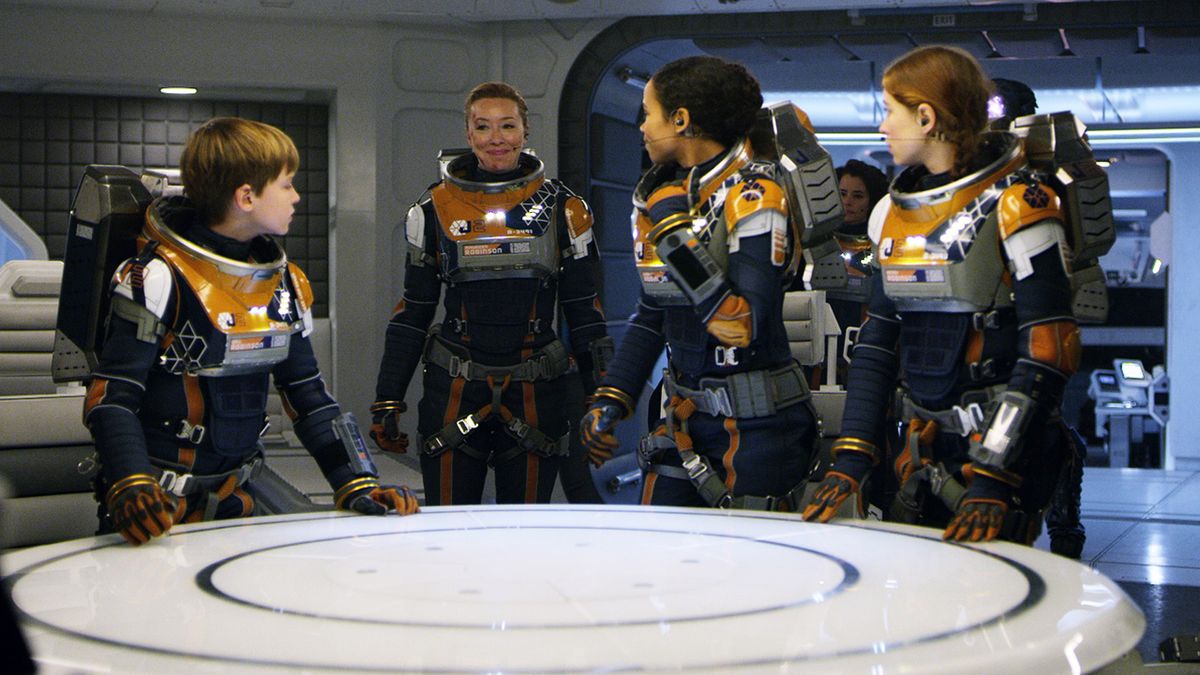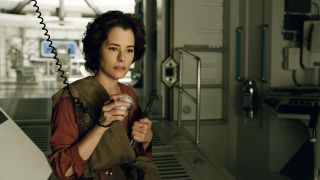12DOVE Verdict
A well imagined, pleasingly watchable sci-fi show with a big heart and a narrative filled with perilous plot twists.
Why you can trust 12DOVE
The new Lost in Space show on Netflix is exactly what it needed to be. It’s wonderfully crafted sci-fi, but almost feels like an antidote to the grimy cyberpunk seriousness of Altered Carbon and Mute. It’s optimistic, family-lead storytelling with just the right mix of peril, victory, feuding, and heart-warming hugs. There’s a definite edge and nastiness to some of the scenarios, but overall this is a hopeful tale of five people sticking together to overcome extreme adversity. With a robot that may or may not kill them. And an actual villain.
From here, there are a few mild spoilers, but they’re contained to the first couple of episodes. However, if you really want to go in completely fresh, I suggest you watch a couple of hours and come back. Cool? Visually, Lost in Space is light-years away from the original show, and the movie, as you’d expect. The planet that the family crash-land on at the very start of episode 1 is - conveniently - a beautiful and varied landscape, encompassing lush forests, endless sand-dunes, frozen mountain peaks, and everything in between. There’s something vaguely alien about the setting, and a handful of neat scenes demonstrate how different this unnamed planet can feel, but largely speaking it’s all quite familiar. If you like your sci-fi wild and weird, the setting will likely underwhelm, but with a relatable environment that looks and acts much like Earth, you’re free to focus on the story, rather than getting bewildered by the intricacies of the world surrounding it. That’s part of the appeal of Star Trek at its best, and Lost in Space definitely has a Gene Roddenberry vibe running throughout.
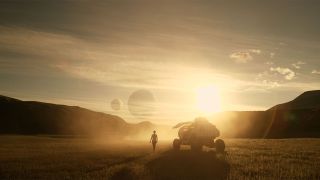
This simplicity and clarity runs through the narrative too. Lost in Space tells its story largely free from jargon or sci-fi tropes, and instead leans heavily on, well, family and survival. Don’t mistake this rather matinee sentiment for a lack of sophistication or thrill, though. Like a decent Star Wars movie, there’s heaps of action, peril, and villainy here, without the showrunners resorting to excessive bloodshed or cruel narrative rug-pulls. Instead, smartly, Lost in Space simply leans on very relatable, very human scenarios to create those intense moments where you cling so hard to the arms of your sofa / partner / pet you’re worried about breaking them.
Dr Smith (Parker Posey) is a perfectly pitched antagonist, her desperate need to survive and extreme selfishness a brilliant counter-point to the Robinson family’s attempts at cohesion and togetherness. Rather than being an outright detestable creature, she’s a manipulative personality with a primal desire to look after herself at the expense of others. Few TV characters can match her knack for manipulation, even though there are moments when you just want to scream ‘OH COME ON!’ at the screen as she somehow escapes punishment or manages to influence another character to do her bidding. By contrast, the Robinsons are all played to types, but necessarily so and often with real depth. John Robinson (Toby Stephens) is your classic patriarch figure and ex-army man, appearing stubborn and one-dimensional at the start. Throughout the show, however, he shows remarkable compassion and sensitivity, becoming the father figure his children need rather than the action hero most sci-fi shows demand. In fact, the strongest character in the whole show is Maureen Robinson (Molly Parker), who often demonstrates resilience and a will to survive at all costs when everyone else has lost the stomach for it. She does so out of a desire to protect herself and her family at all costs, often pushing her children (and husband) well out of their comfort zones… but it all comes from a place of maternal love, and throughout Maureen never loses her sensitivity or femininity, making her one of the best-written female leads in modern TV. Bravo.
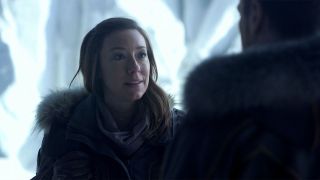
The Robinson ‘children’ all shine in their own ways too, and between them they make up a perfectly broken modern family. While Lost in Space retains the core ethos of the ‘60s original - that spirit of familial-bonding against adversity - 2018’s Robinsons are far from an idealised group. Judy (the eldest daughter, well played by Taylor Russell) is Maureen’s daughter from a previous relationship, and although John is every bit her father having helped raise her from a young age, there are tensions between the two. Penny (Mina Sunwall) is the middle daughter, often providing light-hearted moments and tenderness when the situation gets dire. Finally, Will (Maxwell Jenkins) is the youngest and only son, a more naïve child who struggles most with the life he finds himself in. One of the few criticisms of the show is that Will is often played too innocent, and while this is a handy narrative device to help both his parents balance themselves as characters, it often feels like he exists to create peril rather than as a personality in his own right. There’s little doubt, however, that Will will come into his own during the inevitable season 2.
If it feels like I’ve spent ages talking about the characters rather than the action, well, that’s indicative of Lost in Space itself. Sure, there are some excellent set-pieces and scenarios, and it often feels like the survivors of the Resolute lurch from one disaster to the next - such is the nature of a great, ten episode season run - but it’s the characters who truly make this show what it is. This strength of cast makes us genuinely care when one of them is in jeopardy, regardless of how important they are to the overall narrative. From the opening episode, when Judy’s life is in danger, right through to the final episodes when there are some colossal twists and moments of peril, it’s the Robinson family itself that adds an extra dimension to each piece of danger.
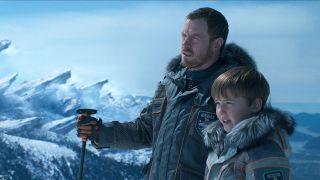
In fact, it’s very telling that the robot - heavily featured in the pre-release marketing and early episodes - quickly becomes secondary to the rest of the show. He’s a tool to ease us through a handful of sticky narrative moments, and ultimately exists to be the substitute father Will needed, helping to bring the Robinson family together. Lost in Space could easily have relied on the robot to carry the first season to its conclusion, but instead uses it to create as many problems as it solves, sewing an unease among the characters and adding an X-factor to already perilous moments. Ironically, the danger he warns of often results from the robot itself.
There are so many other aspects of Lost in Space to call out. The way it deals with trauma and mental health; the lovely elements of romance that warm viewers exactly when they need to; the moments of human weakness and self-interest. But to talk though everything is to spoil the show itself. And it’s fair to say that Lost in Space is far from perfect - especially when it comes to the whole narrative around the rise and resolution of the fuel crisis, which feels very artificial in places. The wildlife on the planet, also, rarely comes across as particularly threatening or alien, with a couple of notable exceptions (you’ll know it when you see it, in an incredibly tense, late scene that involves Penny), which is ironic consider Executive Producer Neil Marshall’s skill in creating horrific menace in his work.
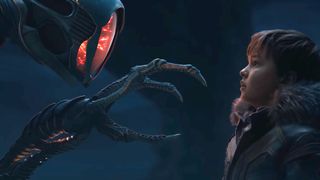
Overall, though, Lost in Space is wonderfully watchable TV with genuine heart. It’s relatable in ways only the very best sci-fi shows and movies can match (we’re talking Star Wars and Star Trek here), and yet still offers an extremely generous quota of thrills and spills. No, it isn’t nasty, complex, deliberately-adult sci-fi, but that doesn’t make it any less worthy of your time. This is essential not because of the cutting edge of its plot or the strength of its violence, but thanks to the humanity, compassion, and warmth of its characters.
Lost in Space is on Netflix now. Want more? Here are the best shows on Netflix and the best movies on Netflix.
MTG Aetherdrift Commanders are more about the destination than the journey because they have basically no vehicles
"There are mods that could shock some players": Final Fantasy 7 Rebirth director agrees mods "breathe life" into games like Fallout and Skyrim, but says please keep it clean
The Rings of Power season 2 had a steep decline in viewership from season 1, but it's not the only show that struggled
